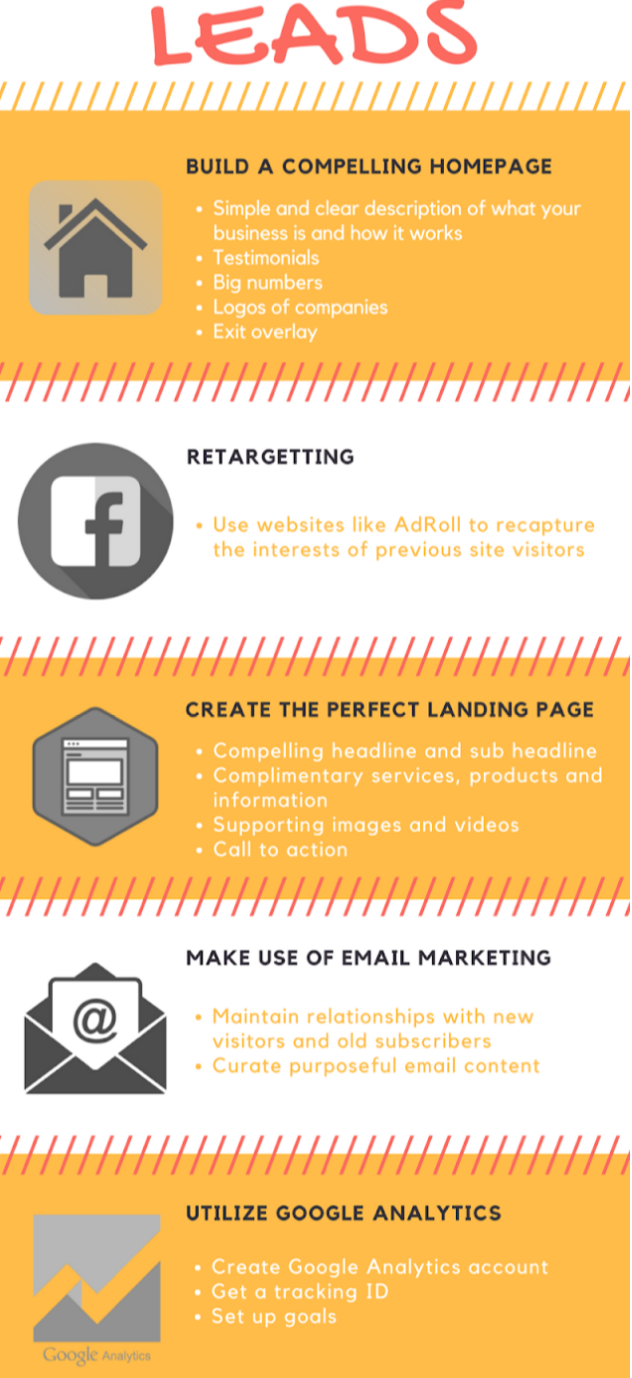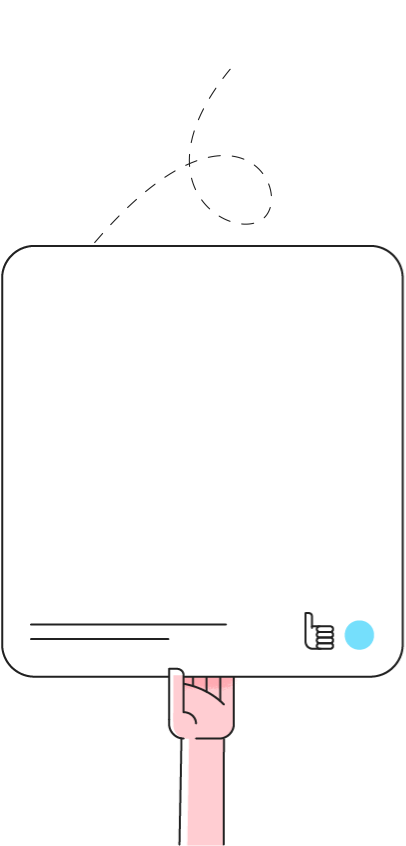Table of Contents
- Build a compelling home page
- Retargeting
- Create the perfect landing page
- Make use of email marketing
- Utilize Google Analytics
- To recap, here’s a useful little infographic:
- Although more and more websites are being created every day, these 5 growth hacks should help increase your visitor to leads conversion rate in no time.
There are four billion users on the internet who go through millions of web pages every day. So how do you drive traffic to your website and increase your conversion rates? Follow these five hacks to ensure you’re increasing your number of visitors to leads.
by Jiamin Wu | 10 minute read
Build a compelling home page
The homepage is one of the first points of contact many visitors will have with your business. That’s why you want to capitalize on the opportunity to win them over before they leave and never visit your site again. That’s an important ecommerce lead generation tactic. In order to increase the duration of a session and the number of pages clicked during a session, here are some key elements to increase engagement on your homepage:
Simple and clear description of what your business is and how it works.
Testimonials.
People relate to other people’s stories. So when you provide social proof of others buying and approving your product, trust is built and this leads to more conversions.
Big numbers.
When visitors see how many customers signed up in the last week, they’ll naturally jump on the bandwagon.

Logos of companies.
If your company works with other well-known companies, put their logos on your home page. They’ll give more credibility to your product or service.
Exit overlay.
These are the messages that pop up telling visitors to sign up for a newsletter or download a free product. Although annoying, they do work in capturing visitors’ information.
Retargeting
Retargeting is a form of online advertising that targets visitors who have previously visited your site. This is the easiest way to determine potential leads because people who have already looked up a product or service your business offers are more likely to search for that product or service again. You can use websites like AdRoll and use their pay-per-click advertising to display your banner to existing visitors on their Facebooks and Twitters.
Create the perfect landing page
Different than your home page, a landing page is a standalone web page that a visitor “lands on” after clicking an online ad. Created specifically for advertising campaigns, its main function is to turn site visitors into leads. Additionally, it helps companies analyze conversation rates and determine the effectiveness of an advertising campaign. In fact, landing pages have 5-15% conversion rates on average!
So let’s get into what every successful landing page should have:
-
Compelling headline and sub-headline.
People’s attention spans are short so you want to capture their attention immediately with a one-sentence description of what the page is about. Examples can include <hard problem you solve> Made Easy or The Future of <blank>. Check out this website to help you generate compelling headlines.
-
Complimentary services, products, and information.
People love free things in life—and it’s no different when it comes to potential customers scouting your business. Complimentary services, products and information such as free PDFs telling your audience how to solve a specific problem and an eBook with free and helpful tips are both good examples of freebies.
-
Supporting images and videos that show your product or service.
They will help visitors believe in the credibility of your business and reduce the amount of text on the page
-
Call to action.
Landing pages are supposed to tell visitors what you want them to do. And the best way to do this is including a large call to action button. Use this to capture the visitor’s information. Examples include “Download Now” or “Join our Mailing List”. Pro tip: do not ask for more than what is necessary. Sometimes asking for a simple email is all you need.
Use Instapage, Leadpages, and Unbounce to help you design landing pages.
Make use of email marketing
Whether you capture visitors’ emails from a landing page or an exit overlay, make sure you can contact those visitors again. Email marketing campaigns are especially useful in keeping your visitors in the loop with your business’ newest updates and sustaining brand awareness. This, in turn, will maintain your relationship with new visitors and old subscribers and potentially turn them into buying customers. But make sure that the content of your emails are purposeful and provide value to your subscribers.
Examples of content could include:
- Upcoming events
- New products or services
- Discount coupons
- Free downloads
MailChimp, AWeber, and GetResponse are some of the tools you can use to create email templates.
Utilize Google Analytics
Google Analytics is the leading web analytics tool and it helps measure, collect, analyze and report web data for the purposes of understanding and optimizing web usage. It’s important to not only drive traffic to your website but also understand what marketing tactics are driving the most traffic to your website.
Setting up Google Analytics for your web page allows you to:
- Set up goals to keep track of the number of visitors that you have turned into leads
- Analyze where you’re losing your customers in the digital marketing funnel
- Understand what content is the most popular on your website
Steps for successfully using Google Analytics:
- Create Google Analytics account.
- Get a tracking ID and input that code on all your pages’ scripts. This will allow Google to track the number of sessions, users and page views on all your pages. From this data, you can better understand your audience’s needs.
- Set up goals. Goals allow you to track specific events such as how many visitors sign up for newsletters or complete purchases.
To recap, here’s a useful little infographic:
 Although more and more websites are being created every day, these 5 growth hacks should help increase your visitor to leads conversion rate in no time.
Although more and more websites are being created every day, these 5 growth hacks should help increase your visitor to leads conversion rate in no time.
Works cited:
[1] https://blog.hubspot.com/blog/tabid/6307/bid/26866/9-must-haves-for-the-perfect-landing-page.aspx












 Although more and more websites are being created every day, these 5 growth hacks should help increase your visitor to leads conversion rate in no time.
Although more and more websites are being created every day, these 5 growth hacks should help increase your visitor to leads conversion rate in no time.

















